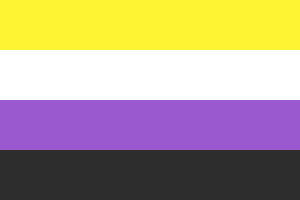Non-binary gender

A non-binary gender (also known as being genderqueer[1]) is any gender that is not just male or female. As the non-binary label falls under the transgender umbrella, many people who are non-binary also identify as transgender. Some non-binary people experience gender dysphoria. The idea that there are only two genders (man and woman) is called the gender binary. A non-binary gender is any gender that is not exclusively part of this gender binary.
Gender identity is different from sexual or romantic orientation.[2] Non-binary people have many sexual and romantic orientations, just as any other gender group.[3]
Examples of non-binary genders include agender, bigender, and genderfluid.
Pronouns and titles[edit]
Some non-binary people may use gender-neutral words to describe themselves. Many non-binary people prefer to be called the pronoun "they" instead of "she" or "he". Other pronouns like "Xe" or "Ey" may be used, these are known to be neopronouns.[4] This also includes noun-self pronouns, such as "bunself," in which the pronoun is tied directly to an alternative expression of gender. This is most common with xenogenders, in which the gender is described by the closest approximation of gender the individual feels and/or is most accurate. While gender neutral pronouns have existed in many languages and cultures, specific neopronouns in English can be found as early as the 1920's in David Lindsay's "A Voyage to Arcturus" in which the neopronoun "ae" is used.[5] However, as individuals, nonbinary may choose whatever pronouns suit them best.
The gender-neutral formal title that is generally used instead of "Mr." or "Ms." is "Mx.", which is pronounced like "mix" or "mux".[6][7]
Related pages[edit]
References[edit]
- ↑ Usher, Raven, ed. (2006). North American Lexicon of Transgender Terms. San Francisco. ISBN 978-1-879194-62-5. OCLC 184841392. Search this book on

- ↑ "Transgender Glossary of Terms". GLAAD Media Reference Guide. Gay & Lesbian Alliance Against Defamation. Retrieved 25 May 2011.
- ↑ Stryker, Susan (2008). Transgender History. Berkeley: Seal Press. ISBN 978-1-58005-224-5. OCLC 183914566. Search this book on

- ↑ "Gender Census 2020: Worldwide Report". Gender Census. 2020-11-07. Retrieved 2021-04-07.
- ↑ "Pronoun Diversity | Psychology Today". www.psychologytoday.com. Retrieved 2023-04-29.
- ↑ Henry, Robin. "Now pick Mr, Mrs, Miss, Ms . . . or Mx for no specific gender". ISSN 0140-0460. Retrieved 2021-04-07.
- ↑ "A Gender-Neutral Honorific". www.merriam-webster.com. Retrieved 2021-04-07.
| This article is a stub. You can help EverybodyWiki by expanding it. |
